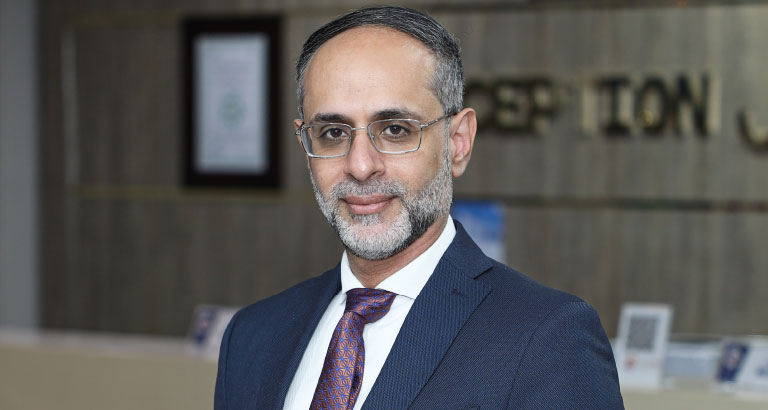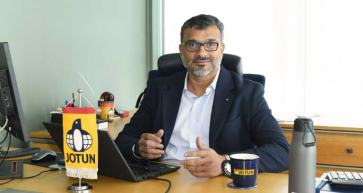
Obesity is one of the main health issues plaguing society today, with the World Health Organisation’s latest figures showing that there are more than a billion people worldwide afflicted with it. This month, we spoke to Dr. Amer Alderazi, President of the Bahrain Medical Society and Consultant General & Bariatric Surgery at Middle East Hospital, to find out more about his career and his expert advice on how to tackle obesity.
Dr. Alderazi has a distinguished career in medicine. After graduating high school from Ahmed Al Omran School, he was awarded a scholarship from the Ministry of Education to study medicine at Alexandria University, Egypt. After his six-year studies, he joined Salmaniya Medical Complex and completed its five-year general surgery residency programme.
He then undertook subspeciality training in advanced minimal invasive and bariatric surgery at McMaster University in Canada. He eventually returned to the Kingdom and was a member of the team which achieved the first weight loss surgery in Bahrain and also pioneered a number of laparoscopic surgeries.
To this effect, Dr. Alderazi’s influence on medicine on the island is immeasurable. Administratively, at Salmaniya he managed the training programme for the Department of Surgery and was the chairman of both the Operating Theatre Committee and the A&E department. He held positions in the National Non-Communicable Disease Committee and the Strategic Planning Committee at the Ministry of Health.
His work within the community can also not be understated. During his career, he has helped to guide and teach hundreds of colleagues throughout their time in medical school. Furthermore, he is the current president of the Bahrain Medical Society, the general secretary of the Gulf Obesity Surgery Society and formerly held positions of vice president of the Bahrain Cancer Society and as ex-president of the Bahrain Surgeons Association.
Now, after 25 years of service at Salmaniya Medical Complex, Dr. Alderazi joined the Middle East Hospital to help establish a centre of excellence for bariatric surgery due to the high demand for it in the region.
He says: “Obesity is the new epidemic worldwide, particularly considering the percentage of childhood obesity which predicts a dire situation to come in the next 20 years. Bahrain is usually ranked in the top 20 countries with the highest obesity rate per capita in its population, with a 2018 World Health Organisation survey estimating that almost 74 percent of the population is either overweight or obese.
“There’s no one individual factor for such a high rate, since obesity itself is a very complex and multifactorial disease. However, people in the GCC tend to eat more and have a higher consumption of carbohydrates such as rice or bread. Moreover, they do not partake in regular physical activities and tend to sleep late.”
Some of the consequences of obesity include a reduction of up to 10 years in average life expectancy, with fatal risks including 14 types of cancers, Type 2 diabetes, high blood pressure, high levels of cholesterol or triglycerides, heart diseases, strokes, sleep apnea and breathing problems, back and knee pain in addition to mental problems and low self-esteem. Ultimately, obesity has been associated with more than 200 health conditions and reducing weight improves the majority of them.
Luckily, thanks to Dr. Alderazi’s expertise, Middle East Hospital can offer a number of options to help those who want to combat obesity.
“We have a comprehensive and multidisciplinary team that addresses every aspect of weight management from the diet and exercise element through to the nonsurgical options and ending with the choice of surgical procedures if needed,” he explains.
“The first step to achieving a sustainable weight loss is always a dietary plan and exercise regimen, which can be offered through our clinical dietician and requires frequent follow-ups. For those who have difficulty losing weight through this route, we may recommend augmenting their efforts with medications.
“Currently, there are two weight-loss injections which are approved for use in the Kingdom. The first is the daily injection of Saxenda and the second is the weekly injection of Ozempic or Weagovy. These medications work by suppressing appetite and reducing the amount a person can eat in each meal. Additionally, they increase the basal metabolic rate marginally which is the amount of calories your body burns each day. Weight is lost through these mechanisms and we generally advise patients to use these medications for periods that range between four-to-six months. The expected weight loss with these medications is around 12 to 15 percent of a patient’s total weight.
 “Another nonsurgical treatment is the intragastric balloon, which is a balloon that we insert inside one’s stomach by either gastroscopy or by swallowing and we later inflate with varying amounts of fluid. They stay in the stomach for any time from three months to a year and occupy a large space inside the stomach, meaning the patient can only manage to eat very small meals. The daily caloric intake is therefore reduced drastically and the expected weight loss with these balloons is around 12-25 kilograms.
“Another nonsurgical treatment is the intragastric balloon, which is a balloon that we insert inside one’s stomach by either gastroscopy or by swallowing and we later inflate with varying amounts of fluid. They stay in the stomach for any time from three months to a year and occupy a large space inside the stomach, meaning the patient can only manage to eat very small meals. The daily caloric intake is therefore reduced drastically and the expected weight loss with these balloons is around 12-25 kilograms.
“Surgical options are variable and include laparoscopic gastric banding, laparoscopic gastric bypass and laparoscopic sleeve gastrectomy. Gastric banding was a very common procedure in the early 2000s and probably the one most people have heard of. However, because of the large amount of weight regain many surgeons abandoned this procedure and currently it is infrequently used to treat obesity.”
Instead, it is the laparoscopic sleeve gastrectomy which is now the most common surgery worldwide and involves keyhole surgery of three-to-five cuts in the abdomen, whereby approximately 75 percent of the stomach is removed. Also removed is a specific part of the stomach, the fundus, which is in charge of secreting a specific hormone called ghrelin, which is responsible for inciting the feeling of being hungry and craving food. Therefore, the level of ghrelin is reduced in the body and cravings are suppressed.
Despite the storied successes of various obesity treatments, Dr. Alderazi stresses, there is no magic button to solve all of a patient’s problems. “One of the most common misconceptions is that surgery means an instant and permanent change. However, it is merely the catalyst for a push in the right direction towards a healthier lifestyle, including regular exercise and a more controlled diet while drinking plenty of water,” he says.
However, with the expertise provided by Dr. Alderazi and the Middle East Hospital, coupled with the obvious visual change after treatment, almost all patients show a marked improvement in self-esteem, confidence and also commitment to their medical instructions.



